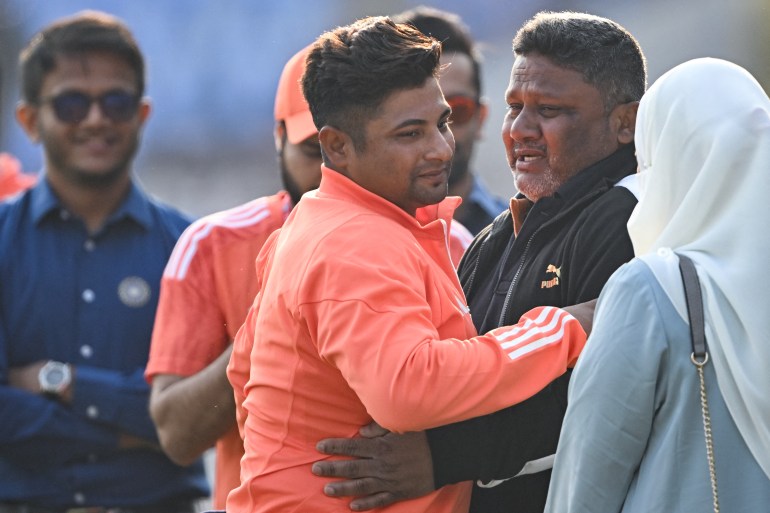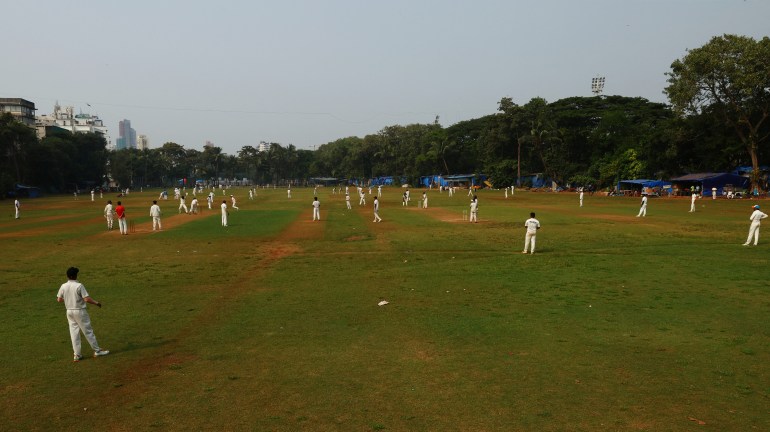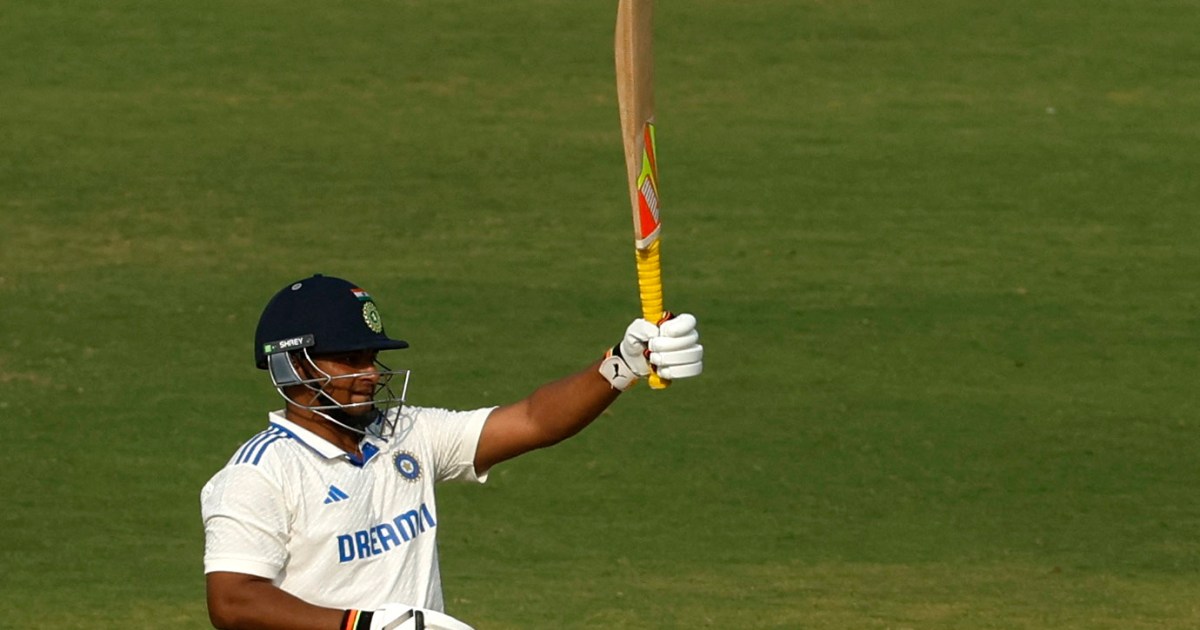Sarfaraz Khan: A Mumbai maidan cricketer’s long wait for India cap
Mumbai, India – Batting for nearly 10 hours at Mumbai’s Cross Maidan, Sarfaraz Khan first stole the limelight as a schoolboy in 2009 when he rewrote the history of the famed ground in the Indian metropolis renowned for producing great batters.
The then-12-year-old recorded the highest-ever score in the Harris Shield, a tournament known as the Holy Grail of school cricket in the city.
Dressed in traditional cricket whites – loose-fitting white shirt and track pants – the strongly-built boy from Kurla, an eastern lower middle-class suburb of the bustling city, scored 439 runs and became a national sensation.
Playing for Rizvi Springfield in the Under-16 category, Sarfaraz hit 56 fours and 12 sixes in his innings as he broke Ramesh Nagdev’s 46-year-old record of 427 not out. On his way, Sarfaraz went past the score of another Ramesh – the 346 runs scored by cricket legend Sachin Ramesh Tendulkar in 1988.
Following Sarfaraz’s record-breaking achievement, local newspapers and national media were quick to wonder if he would be “the next Tendulkar”, but the prodigy slid into obscurity.
For years, Sarfaraz sweated it out on Mumbai’s maidans (grounds) as he forged an impressive career in first-class cricket awaiting a call from the national selectors.
But as seasons passed and opportunities seemingly slipped through his grasp, Sarfaraz found himself in the shadows. He watched Shubman Gill, Prithvi Shaw and Yashasvi Jaiswal – batters who came after him – take the big stage.
After spending a decade waiting for his moment, the gutsy batter finally found himself donning the Indian Test cap last month.
On February 15, 14 years since that record-breaking outing in the maidans, Sarfaraz made his Test debut against England in Rajkot, Gujarat.
Sarfaraz was given the nod by the selectors after absences and injuries finally forced their hand.
“It is a matter of pride to be selected from a population of more than 1.4 billion,” Sarfaraz said in an interview with the Board of Control for Cricket in India (BCCI).
Following a round of applause from his teammates as he received the cap from ex-captain Anil Kumble, Sarfaraz rushed to his father and wife to celebrate.
Realising the arduous journey to the top was finally over, Naushad, Sarfaraz’s father and coach, kissed the cap and burst into tears.
“It was Abbu’s [my father’s] dream first to play for India,” Sarfaraz said.
“Unfortunately, that didn’t happen. Things weren’t [financially] that strong at home. Then he thought he would focus on his children, and he worked hard on me … This was the proudest moment of my life.”
Naushad, the player-turned-coach, had found a new perspective at the end.
“Earlier, I used to think why aren’t my dreams becoming a reality … but after Sarfaraz received his cap for India, my thinking has changed,” he said.
“For all the children who are striving hard, I would like to tell them: Give the night’s passage its time. The sun will rise in its own time.”

‘Everyone is talking about him’
On the day of his debut, Sarfaraz had to wait for four hours to score his first runs as he went out to bat at number six.
In the first innings, the 26-year-old scored a half-century and looked set for his maiden Test hundred, but was run out for 62 after a communication mix-up with Ravindra Jadeja.
In the second innings, he remained 68 not out, becoming only the fourth Indian cricketer to score twin fifties on his Test debut, as India comfortably won the match to take a 2-1 series lead.
Sarfaraz became the talk of the town.
At the very maidans where Sarfaraz’s journey began, coaches and young cricketers were in awe.
For Mohammed Akram Shaikh, who trained with Sarfaraz about a decade ago at Mumbai’s popular Azad Maidan, it was a moment of pride.
“I felt really happy watching him play,” Shaikh, who runs a cricket academy, said, pointing to the goosebumps on his hands. “I felt so proud that a kid who played here made such strides.”
As a schoolboy, Sarfaraz often tested himself against bowlers much older than him and by the age of 17, he was playing in the Ranji Trophy, India’s first-class championship, for Mumbai.
He would go on to represent India at the 2014 and 2016 ICC Under-19 World Cups and make his debut in the Indian Premier League (IPL).
But he had to endure a 10-year wait before his first Test call-up – playing 46 matches in first-class cricket with an impressive average of 70.
“Sarfaraz had to wait for a long time but he got his chance at the right time because now everyone is talking about him,” Shaikh said.
Double hundred
Double fiftyThis duo of Yashasvi & Sarfaraz has been double trouble for England. I couldn’t watch them play live, but was very pleased to hear about their knocks. Keep it up! 🏏 🇮🇳 #INDvENG pic.twitter.com/54XVb35HCs
— Sachin Tendulkar (@sachin_rt) February 18, 2024
The magic of maidans
Sarfaraz is the latest success story to emerge out of Mumbai’s iconic maidans, which have produced some of India’s best batters such as the legendary Tendulkar, current Test captain Rohit Sharma, former skipper Sunil Gavaskar, and batting great Vijay Merchant.
The maidans are the home of cricket in Mumbai.
It is on the red soil of those dusty fields that dreams take root and aspirations soar, as young boys hone their skills from early morning to evening, often under the scorching sun.
Known as the nursery of cricket, these maidans often have uneven outfields filled with stones and rocks. The fields are not the best maintained, with rubbish scattered around the periphery.
The Azad Maidan is home to 22 pitches. All those pitches, except one, overlap each other, posing a challenge for players to dodge the ball from adjacent pitches.
The surfaces test players with a variety of conditions, and for the batsmen, scoring a 100 is the benchmark.
“Anybody who can play here can play anywhere in the world because the wickets here are quite challenging,” Shaikh said. “The surface is uneven, so the ball bounces a lot.
“Both the bowlers and batsmen face a test here and even while fielding it can be difficult because sometimes the ball can hit your face.”
Izaan Shaikh, a youngster from Goa, had the opportunity to train with Sarfaraz at the ground last year.
Izaan, who trains at the Macho Cricket Academy run by Sarfaraz’s family, said Sarfaraz would often share tips with young players.
“Sarfu bhai [brother Sarfaraz] is a very hard-working person. His story inspires me,” 20-year-old wicketkeeper-batter, who is coached by Sarfaraz’s brother Moin, told Al Jazeera.
“He has shown that when you put in effort, you get a happy ending after all.”

‘Unbelievable commitment’
Fitness issues, a failed move from Mumbai to the Uttar Pradesh team in domestic cricket and injuries set Sarfaraz back for some time before delivering strong performances in the past four domestic seasons.
Deepak Lotlikar, ground in charge of the Karnataka Sporting Association at Cross Maidan, has witnessed Sarfaraz’s struggle from up close.
“I have seen Sarfaraz play since his childhood,” Lotlikar said. “He was a little naughty as a child and goofy too. But he was very passionate about cricket. His commitment was unbelievable.”
Lotlikar was at the maidan with Sarfaraz’s brother Moin when his selection for India was announced.
“I broke the news to Moin and he was so emotional at that time,” Lotlikar said with moist eyes. “He rested his head on my shoulder and burst into tears – all of us at the maidan did.”
Sarfaraz went on to play the fourth and fifth Tests and lifted the series winners’ trophy last week. It remains to be seen whether his 200 runs in three innings will keep him in the Test side once the likes of Virat Kohli and KL Rahul return, but Sarfaraz has done enough to inspire young cricketers at Cross Maidan.
For 10-year-old Mudassar Shaikh, Sarfaraz is already a hero.
“I hope I can be like Sarfaraz one day,” he said with a smile.





